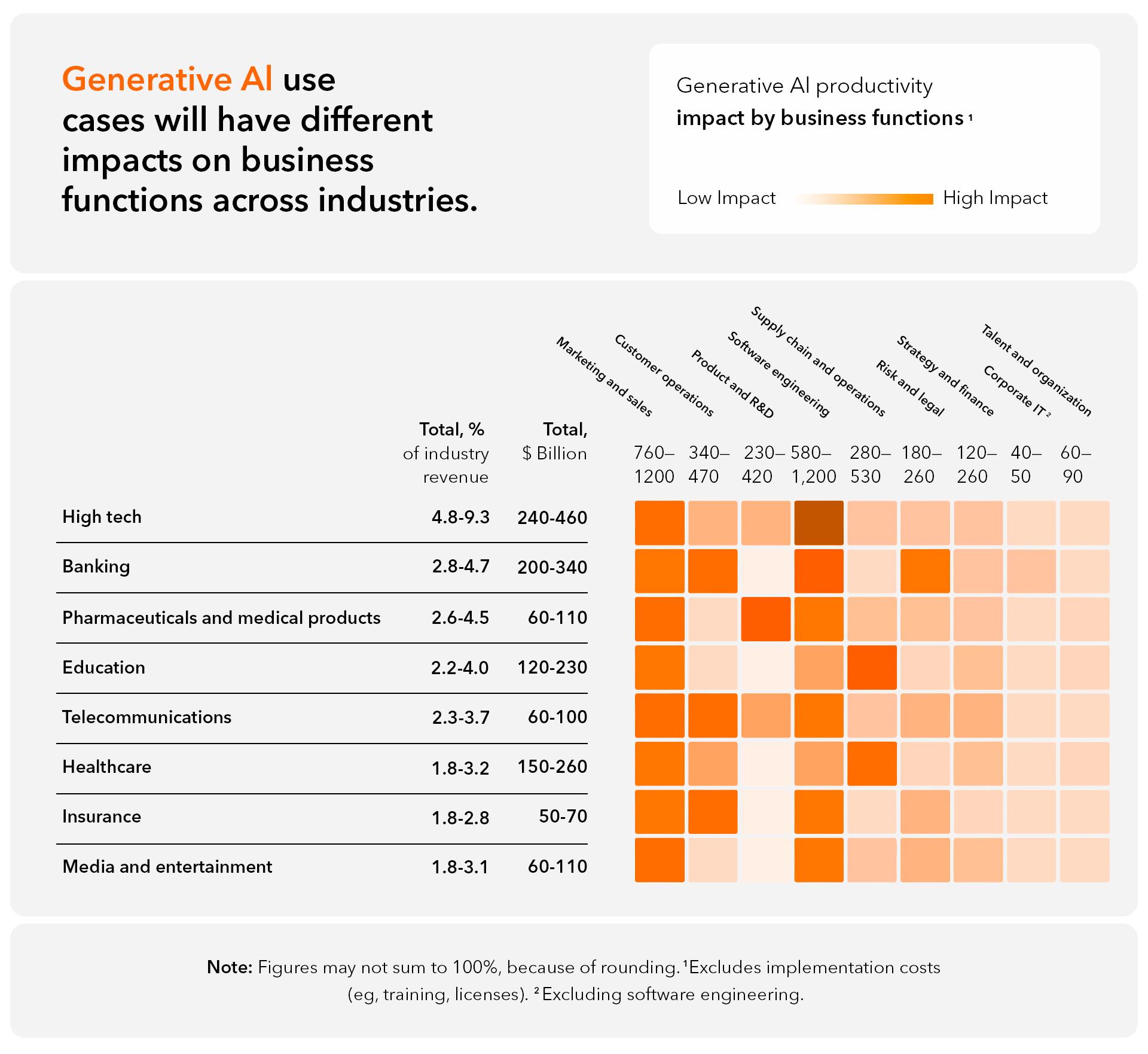Artificial Intelligence (AI) continues evolving and shaping how businesses operate. As we step into 2024, forward-thinking enterprises must stay ahead of the curve and embrace the latest AI trends. These trends not only promise to enhance efficiency but also have the potential to revolutionize various industries.
Generative AI products and tools employ models that, based on existing training data, can generate text, images, and audio sequences. Their impact on technical automation and assistance, particularly in problem-solving and content generation, extends across numerous industries, from education and STEM professions to food and transportation services.
Which industries will be the most affected?
While predicting the future impact of AI with absolute certainty is challenging, several trends and potential impacts are anticipated in 2024 across various industries.
Besides the impact on technology, AI will play a significant role in banking/fintech, education, healthcare, telecommunications, media, and entertainment. Of course, some will gain more than others but that doesn't take away the incredible influence of AI in various businesses of different sectors.

There are rumors and fears about AI taking over more jobs, especially if your industry is amongst those shown above. However, instead of being afraid, I suggest you learn about the AI-based tools you can use to improve productivity, costs, processes, etc.
Other areas of interest to implement AI tools
Responsible AI practices or Ethical AI
With great power comes great responsibility. In 2024, businesses increasingly recognize the importance of ethical and responsible AI practices.
The call for transparency, fairness, and accountability in AI systems is gaining momentum among stakeholders. It is no longer an optional choice but a necessity to incorporate ethical considerations into AI development. This necessity is the cornerstone for establishing trust and ensuring sustained success, not just within businesses but for society as a whole. It's a call that every entity must heed and prepare for.Understanding the fundamentals of ethical AI is not limited to experts; it serves as a guide for everyone. Whether you're looking for a basic understanding of ethical AI or delving into AI’s in-depth ethical intricacies, there are courses designed to cater to different levels of comprehension.
Edge AI: Redefining real-time processing
As the Internet of Things (IoT) continues to grow, so does the demand for real-time data processing. Edge AI is the integration of AI algorithms directly on devices at the edge of networks. This is poised to redefine how businesses handle and analyze data. Imagine quicker decisions, less waiting, and smoother operations—all by processing data right where it's generated.
This isn't just about speed; it's about devices becoming smarter, making instant decisions, and cutting dependence on centralized systems. Edge AI means devices that act faster, offering real-time insights. It's a game-changer, shaping how businesses use data and transforming the future of data processing across industries.
Customer service through conversational AI
Chatbots and virtual assistants have transformed into sophisticated conversational AI platforms. In the landscape of 2024, businesses are amplifying efforts to offer personalized, context-aware interactions. Conversational AI surpasses mere query responses; it involves deciphering user intent, delivering nuanced replies, and crafting seamless customer experiences.
When writing this post, AI-driven customer service and self-service are not quite ready as many edge cases, such as selling cars for $1, are yet to be considered. However, these kinds of issues are necessary to ensure that systems can effectively handle a wide range of scenarios, including, especially, unethical ones.
AI-powered Cybersecurity
Amidst the escalating sophistication of cyber threats, AI plays a pivotal role in bolstering cybersecurity efforts. Machine learning algorithms can analyze vast datasets to identify patterns and anomalies, enhancing the ability to detect and respond to security threats in real-time. In 2024, channeling resources into AI-powered cybersecurity measures becomes indispensable for fortifying the protection of sensitive information.
Trainable chats
Not a 2024 thing since they are already all over the place. However, company-specific trainable chats, just like ChatGPT but for your knowledge base will be a common thing. With OpenAI releasing its GPTs it’s easy to make your assistants for your employees, potential clients, etc. If you want to go some miles deeper, you can use OpenAI APIs to build your interfaces or secret implementations 🤫
How do you decide what AI tools to use?
Hey, there, good old friend “It depends”. Every industry is different, and even more, every organization is different. You should take several factors that impact your workspace to make a decision.
To keep it as simple yet helpful as possible, answer the following questions:
- What are your needs or goals?
- Who is going to use it?
- How many people are going to use it?
- What’s the usage frequency?
- What processes does it impact? Are they important?
- Does it require technical assistance?
- Is it compatible with your company’s policies?
- Does it fit in your company’s budget?
2024 holds exciting possibilities for businesses and professionals that embrace the latest AI trends. By staying up-to-date and strategically incorporating these trends into your operations, individuals and companies can take the lead in driving innovation and shaping the future in this dynamic AI-driven era.

